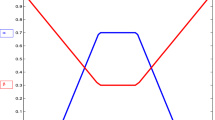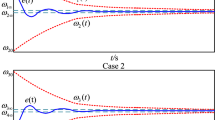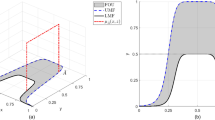Abstract
In this paper, we present an adaptive neuro-fuzzy controller design for a class of uncertain nonholonomic systems in the perturbed chained form with unknown virtual control coefficients and strong drift nonlinearities. The robust adaptive neuro-fuzzy control laws are developed using state scaling and backstepping. Semiglobal uniform ultimate boundedness of all the signals in the closed-loop are guaranteed, and the system states are proven to converge to a small neighborhood of zero. The control performance of the closed-loop system is guaranteed by appropriately choosing the design parameters. By using fuzzy logic approximation, the proposed control is free of control singularity problem. An adaptive control-based switching strategy is proposed to overcome the uncontrollability problem associated with x 0(t 0) = 0.
Similar content being viewed by others
References
R. Brockett. Asymptotic stability and feedback stabilization[M]// Differential Geometry Control Theory. New York: Birkaeuser, 1983:181–208.
J. Guldner, V. I. Utkin. Stabilization of non-holonomic mobile robots using Lyapunov function for navigation and sliding mode control[C]//Proceedings of the 33rd IEEE Conference on Decision and Control. New York: IEEE, 1994: 2967–2972.
A. Astolfi. Discontinuous control of nonholonomic systems[J]. Systems & Control Letters, 1996, 27(1): 37–45.
C. Samson. Time-varying feedback stabilization of a nonholonomic wheeled mobile robot[J]. International Journal of Robotics Research, 1993, 12(8): 55–66.
O. J. Sodalen, O. Egeland. Exponential stabilization of nonholonomic chained systems[J]. IEEE Transactions on Automatic Control, 1995, 40(1): 35–49.
I. Kolmanovsky, N. McClamroch. Development in nonholonomic control problems[J]. IEEE Control System Magazine, 1995, 15(6): 20–36.
R. Murray, S. Sastry. Nonholonomic motion planning: Steering using sinusoids[J]. IEEE Transactions on Automatic Control, 1993, 38(5): 700–716.
R. MCloskey, R. Murray. Convergence rates for nonholonomic systems in power form[C]//Proceedings of the American Control Conference. Evanston: American Automatic Control Council, 1992: 2489–2493.
W. Huo, S. S. Ge. Exponential stabilization of nonholonomic systems: an ENI approach[J]. International Journal of Control, 2001, 74(15): 1492–1500.
S. S. Ge, Z. Sun, T. H. Lee, et al. Feedback linearization and stabilization of second-order nonholonomic chained systems[J]. International Journal of Control, 2001, 74(14): 219–245.
R. Murray. Control of nonholonomic systems using chained form[J]. Fields Institute Communications, 1993, 1: 219–245.
Z. Sun, S. S. Ge, W. Huo, et al. Stabilization of nonholonomic chained systems via nonregular feedback linearization[J]. Systems & Control Letters, 2001, 44(4): 279–289.
Z. Jiang, H. Nijmeijer. A recursive technique for tracking control of nonholonomic systems in chained form[J]. IEEE Transactions on Automatic Control, 1999, 44(2): 265–279.
R. Colbaugh, R. Barany, K. Glass. Adaptive control of nonholonomic mechanical systems[C]//Proceedings of the 35th IEEE Conference on Decision and Control. New York: IEEE, 1996: 1428–1434.
J. P. Hespanha, S. Liberzon, A. S. Morse. Towards the supervisory control of uncertain nonholonomic systems[C]//Proceedings of the American Control Conference. Piscataway: IEEE, 1999: 3520–3524.
W. E. Dixon, D. M. Dawson, E. Zergeroglu, et al. Nonlinear Control of Wheeled Mobile Robots[M]. London: Springer-Verlag, 2001.
S. S. Ge, Z. P. Wang, T. H. Lee. Adaptive stabilization of uncertain nonholonomic systems by state and output feedback[J]. Automatica, 2003, 39(8): 1451–1460.
Z. Jiang. Robust exponential regulation of nonholonomic systems with uncertainties[J]. Automatica, 2000, 36(2): 189–209.
S. S. Ge, C. C. Hang, T. H. Lee, et al. Stable Adaptive Neural Network Control[M]. Boston: Kluwer Academic Publisher, 2002.
A. Yesildirek, F. L. Lewis. Feedback linearization using neural networks[J]. Automatica, 1995, 31(11): 1659–1664.
E. B. Kosmatopoulos. Universal stabilization using control lyapunov functions, adaptive derivative feedback, and neural network approximator[J]. IEEE Transactions on Systems, Man, and Cybernetics-Part B, 1998, 28(3): 472–477.
G. A. Rovithakis. Stable adaptive neuro-control design via lyapunov function derivative estimation[J]. Automatica, 2001, 37(8): 1213–1221.
R. Fierro, F. L. Lewis. Control of a nonholonomic mobile robot: backstepping kinematics into dynamics[C]//Proceedings of the 34th IEEE Conference on Decision and Control. New York: IEEE, 1995: 3805–3810.
S. S. Ge, T. H. Lee, C. J. Harris. Adaptive Neural Network Control of Robotic Manipulators[M]. London: World Scientific, 1998.
H. Han, C. Su, Y. Stepanenko. Adaptive control of a class of nonlinear systems with nonlinearly parameterized fuzzy approximators[J]. IEEE Transactions on Fuzzy Systems, 2001, 9(2): 315–323.
A. Bloch, S. Drakunov. Stabilization and tracking in the nonholonomic integrator via sliding modes[J]. Systems & Control Letters, 1996, 29(2): 91–99.
C. Samson. Control of chained systems: Application to path following and time-varying point-stabilization of mobile robots[J]. IEEE Transactions on Automatic Control, 1995, 40(1): 64–77.
G. C. Walsh, L. G. Bushnell. Stabilization of multiple input chained form control systems[J]. Systems & Control Letters, 1995, 25(3): 227–234.
A. Bloch, M. Reyhanoglu, N. H. McClamroch. Control and stabilization of nonholonomic dynamic systems[J]. IEEE Transactions on Automatic Control, 1992, 37(11): 1746–1757.
O. J. Sørdalen. Conversion of the kinematics of a car with n trailers into a chained form[C]//IEEE International Conference on Robotics and Automation. Los Alamitos: IEEE Computer Society Press, 1993: 382–387.
R. M. Murray. Nilpotent bases for a class of nonintegrable distributions with applications to trajectory generation for nonholonomic systems[J]. Mathematics of Control Signals and Systems, 1994, 7(1): 58–75.
L. Bushnell, D. Tilbury, S. S. Sastry. Steering three-input chained form nonholonomic systems using sinusoids: The firetruck example[C]//Proceedings of the European Control Conference. Berkeley: University of California, 1993: 1432–1437.
A. Isidori. Nonlinear Control Systems[M]. 3rd ed. Berlin: Springer-Verlag, 1995.
S. S. Ge, C. C. Hang, T. Zhang. Design and performance analysis of a direct adaptive controller for nonlinear systems[J]. Automatica, 1999, 35(11): 1809–1817.
L. Jia, S. S. Ge, M.-S. Chiu. Adaptive neuro-fuzzy control of non-affine nonlinear systems[C]//Proceedings of IEEE International Symposium on Intelligent Control. Piscataway: IEEE, 2005: 286–291.
M. Krstić, I. Kanellakopoulos, P. V. Kokotović. Nonlinear and Adaptive Control Design[M]. New York: John Wiley & Sons, 1995.
E. D. Sontag. A ‘universal’ construction of artstein’s theorem on nonlinear stabilization[J]. Systems & Control Letters, 1989, 13(2): 117–123.
A. Astolfi, W. Schaufeberger. State and output feedback stabilization of multiple chained systems with discontinuous control[C]// Proceedings of the 35th IEEE Conference on Decision and Control. New York: IEEE, 1996: 1443–1447.
V. I. Arnold. Geometrical Methods in the Theory of Ordinary Differential Equations[M]. Berlin: Springer-Verlag, 1987.
M. M. Polycarpou, P. A. Ioannou. A robust adaptive nonlinear control design[J]. Automatica, 1996, 32(3): 423–427.
M. Sampei, T. Tamura, T. Kobayashi, et al. Arbitrary path tracking control of articulated vehicles using nonlinear control theory[J]. International Journal of Robotics Research, 1995, 3(1): 125–131.
Author information
Authors and Affiliations
Corresponding author
Additional information
Fan HONG received the Ph.D. degree from the National University of Singapore in 2004. She was with the Department of Electrical & Computer Engineering and the Department of Mechanical Engineering, National University of Singapore, from 2003 to 2005. She is with Data Storage Institute, A*STAR, since 2005 as a senior research fellow. She has been invited to give talks in 2009 JSME-IIP/ASME-ISPS Joint Conference on Micromechatronics for Information and Precision Equipment, Ibaraki, Japan, 2009, and the 7th International Conference on Control and Automation, Christchurch, New Zealand, 2009. Her research interests include adaptive control, robust control, intelligent control of various mechanical-electronic systems, and real-time application and implementation of hard-disk-drive servo systems. She has published more than 40 research papers and one book chapter.
Shuzhi Sam GE received the B.S. degree in Control Engineering from Beijing University of Aeronautics and Astronautics (BUAA), Beijing, China, in 1986 and the Ph.D. degree in Robotics and the Diploma of Imperial College (DIC) from Imperial College of Science, Technology and Medicine, London, U.K., in 1993. He is a founding director of Social Robotics Lab, Interactive Digital Media Institute and a full professor at the Department of Electrical and Computer Engineering, National University of Singapore, Singapore. He has (co)authored three books: Adaptive Neural Network Control of Robotic Manipulators (Singapore: World Scientific, 1998), Stable Adaptive Neural Network Control (Norwell, MA: Kluwer, 2001), and Switched Linear Systems: Control and Design (New York: Springer-Verlag, 2005). He edited a book Autonomous Mobile Robots: Sensing, Control, Decision Making and Applications (New York: Taylor and Francis, 2006), and published over 300 international journal and conference papers. His current research interests include social robotics, multimedia fusion, adaptive control, and intelligent systems.
Dr. Ge has served/been serving as an associate editor for a number of flagship journals, including the IEEE Transactions on Automatic Control, the IEEE Transactions on Control Systems Technology, the IEEE Transactions on Neural Networks, and Automatica. He also serves as an editor of the Taylor & Francis Automation and Control Engineering Series. He serves as vice president of Technical Activities, IEEE Control Systems Society. He provides technical consultation to industrial and government agencies. He is the editor-in-chief of the International Journal of Social Robotics.
Chee Khiang PANG (Justin) was born in Singapore in 1976. He received the B.E. (Hons.), M.E., and Ph.D. degrees in 2001, 2003, and 2007, respectively, all in Electrical and Computer Engineering, from National University of Singapore (NUS), working closely with A*STAR Data Storage Institute (DSI), Singapore. In 2003, he was a visiting fellow in the School of Information Technology and Electrical Engineering (ITEE), University of Queensland (UQ), Brisbane, QLD, Australia, working on probabilistic small signal stability of large-scale interconnected power systems project funded by Electric Power Research Institute (EPRI), Palo Alto, CA, USA. From 2006 to 2008, he was a researcher (tenure) with Central Research Laboratory, Hitachi Ltd., Kokubunji, Tokyo, Japan. In 2007, he was a visiting academic in School of ITEE, UQ, Brisbane, QLD, Australia, and was invited by the IEEE Queensland Section to give a seminar. From 2008 to 2009, he was a visiting research professor in the Automation & Robotics Research Institute, University of Texas at Arlington, TX, USA. Currently, he is an assistant professor in the Department of Electrical and Computer Engineering, National University of Singapore. He is a member of IEEE. In 2008, he was a guest editor for Transactions of the Institute of Measurement and Control. He was an International Program Committee Member for the 2007 IEEE Congress on Evolutionary Computation (CEC). He is a reviewer of many international referred journals and conferences. His current research interests include intelligent diagnosis and prognosis of industrial networked systems, small signal stability analysis for large-scale inter-connected power systems, and precision control of actuators for data storage systems. He has authored more than 40 technical publications, and is currently co-authoring a research monograph by C. K. Pang, F. L. Lewis, T. H. Lee, and Z. Y. Dong, Intelligent Diagnosis and Prognosis of Industrial Networked Systems, in preparation to be submitted to Taylor and Francis Group, CRC Press, December 2010, in this area.
Tong Heng LEE received the B.A. degree with First Class Honors in the Engineering Tripos from Cambridge University, England, in 1980 and the Ph.D. degree from Yale University in 1987. He is a professor in the Department of Electrical and Computer Engineering at the National University of Singapore (NUS), and also a professor in the NUS Graduate School, NUS NGS. He was a past vicepresident (research) of NUS. Dr. Lee’s research interests are in the areas of adaptive systems, knowledge-based control, intelligent mechatronics and computational intelligence. He currently holds associate editor appointments in the IEEE Transactions in Systems, Man and Cybernetics; IEEE Transactions in Industrial Electronics; Control Engineering Practice (an IFAC journal); and the International Journal of Systems Science (Taylor and Francis, London). In addition, he is the deputy editor-in-chief of IFAC Mechatronics journal. Dr. Lee was a recipient of the Cambridge University Charles Baker Prize in Engineering; the 2004 ASCC (Melbourne) Best Industrial Control Application Paper Prize; the 2009 IEEE ICMA Best Paper in Automation Prize; and the 2009 ASCC Best Application Paper Prize. He has also co-authored five research monographs (books), and holds four patents (two of which are in the technology area of adaptive systems, and the other two are in the area of intelligent mechatronics). He has published more than 300 international journal papers. Dr. Lee was an invited panelist at the World Automation Congress, WAC2000, Maui, U.S.A.; an invited keynote speaker for the IEEE International Symposium on Intelligent Control, IEEE ISIC 2003 Houston U.S.A.; an invited keynote speaker for LSMS 2007, Shanghai China; an invited expert panelist for IEEE AIM2009; and an invited plenary speaker for IASTED RTA 2009.
Rights and permissions
About this article
Cite this article
Hong, F., Ge, S.S., Pang, C.K. et al. Robust adaptive neuro-fuzzy control of uncertain nonholonomic systems. J. Control Theory Appl. 8, 125–138 (2010). https://doi.org/10.1007/s11768-010-0006-y
Received:
Published:
Issue Date:
DOI: https://doi.org/10.1007/s11768-010-0006-y




